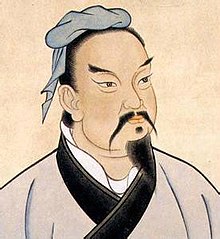Our website is made possible by displaying online advertisements to our visitors.
Please consider supporting us by disabling your ad blocker.
Sun Tzu
Sun Tzu (/suːn ˈdzuː, suːn ˈsuː/ soon DZOO, soon SOO;[1][2] traditional Chinese: 孫子; simplified Chinese: 孙子; pinyin: Sūnzǐ) was a Chinese military general, strategist, philosopher, and writer who lived during the Eastern Zhou period (771–256 BC). Sun Tzu is traditionally credited as the author of The Art of War, an influential work of military strategy that has affected both Western and East Asian philosophy and military thought. Sun Tzu is revered in Chinese and East Asian culture as a legendary historical and military figure. His birth name was Sun Wu (traditional Chinese: 孫武; simplified Chinese: 孙武) and he was known outside of his family by his courtesy name Changqing (Chinese: 長卿).[3] The name Sun Tzu—by which he is more popularly known—is an honorific which means "Master Sun".
Sun Tzu mastered the military science of ancient China and created the military doctrine of asymmetrical warfare. According to it, an attack on the enemy should begin only after the enemy has no opportunity to either defend or counterattack. It was used in the wars in the era of the Warring States in ancient China (about 475–221 BC). Those combat combinations had specific names, descriptions and classifications.
Sun Tzu's historicity is uncertain. The Han dynasty historian Sima Qian and other traditional Chinese historians placed him as a minister to King Helü of Wu and dated his lifetime to 544–496 BC. Many modern scholars accepting his historicity place the extant text of The Art of War in the later Warring States period of 475 to 221 BC, based on its style of composition and its descriptions of warfare.[4] Traditional accounts state that the general's descendant Sun Bin wrote a treatise on military tactics, also titled The Art of War. Since both Sun Wu and Sun Bin were referred to as "Sun Tzu" in classical Chinese texts, some historians believed them identical, prior to the rediscovery of Sun Bin's treatise in 1972.
Sun Tzu's work has been praised and employed throughout the arc of East Asian military history since its composition, and eventually earned global attention. During the twentieth century, The Art of War grew in popularity and saw practical use in the Western world as well. It remains influential in many contemporary competitive endeavors across the modern world beyond military strategy and warfare, including espionage,[5] culture, governance, business, and sports.[6][7][8][9]
- ^ "Sun Tzu". Columbia Electronic Encyclopedia (2013).
- ^ "Sun Tzu". The American Heritage Dictionary of the English Language (5th ed.). HarperCollins. Retrieved 25 October 2019.
- ^ "孙子 – 国学网". guoxue.com (in Chinese). 14 May 2015. Retrieved 26 July 2024.
- ^ Sawyer 2007, pp. 421–422.
- ^
McNeilly, Mark R. (2015). Sun Tzu and the Art of Modern Warfare (updated ed.). Oxford: Oxford University Press. p. 301. ISBN 978-0-19-995785-9. Retrieved 14 December 2022.
Sun Tzu is not talking about 'news' here but about espionage affairs, or matters or plans relating to espionage.
- ^ Scott, Wilson (7 March 2013), "Obama meets privately with Jewish leaders", The Washington Post, Washington, D.C., archived from the original on 24 July 2013, retrieved 22 May 2013
- ^ "Obama to challenge Israelis on peace", United Press International, 8 March 2013, retrieved 22 May 2013
- ^ Garner, Rochelle (16 October 2006), "Oracle's Ellison Uses 'Art of War' in Software Battle With SAP", Bloomberg, archived from the original on 20 October 2015, retrieved 18 May 2013
- ^ Hack, Damon (3 February 2005), "For Patriots' Coach, War Is Decided Before Game", The New York Times, retrieved 18 May 2013
Previous Page Next Page



